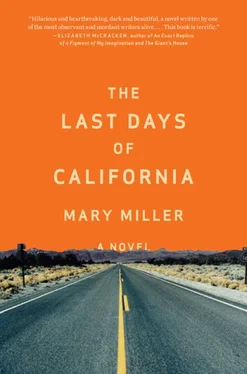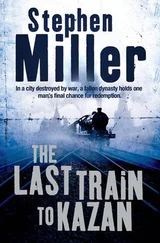“You know Marshall hasn’t given away any of his money,” Elise said as our car began to veer off the road again.
“Dad,” I said. He yanked it so hard we went into the other lane.
“It would be a nice gesture, don’t you think?” she asked.
“It would be a nice gesture,” I agreed. “A lot of people gave their money away—the Ultcheys and the Smiths.”
“And the Sellers,” Elise said. Dan was a Sellers. If the rapture didn’t happen, Dan was going to be poor and wouldn’t be able to help her raise the baby, or even pay for an abortion.
“Hopefully they didn’t give it all away,” I said.
“All of it,” she said. “What’s the point otherwise? To show people that you half -believe? That you one-quarter believe?”
“They’ll be taken care of,” our father said.
“But, seriously. Don’t you think he should give his money away? Prove he believes what he says he does?”
“He’s not required to prove anything,” our father said.
“But he’s convinced all these other people to do something he’s not willing to do.”
“Do you think all of this is free?” he asked, waving his biscuit around. “All the caravans and billboards? He’s spent millions of dollars of his own money. They’re all over the world, from Abu Dhabi to Katmandu.”
I had no idea where those places were, but I recalled an episode of Garfield when he put Nermal in a box and addressed it to Abu Dhabi. I thought it was a made-up place.
“There’s nothing here,” Elise said quietly.
“I can always count on you to ask the tough questions,” he said.
“I could come up with some tougher ones if you like.” She popped the lid off her pancakes and smeared the butter around with a finger. I passed my wrapper up to my mother and she handed me another biscuit. I’d only asked for one, but I took it and unwrapped it. While I ate, I watched out the window: the grass was brittle and yellow; shreds of tire lined the side of the road. In the span of a minute, I saw two dead dogs and one dead armadillo. I didn’t care about the armadillos, but the dogs about killed me. I mentioned it and my mother told the story of the time she ran over a turtle. I’d heard this story a dozen times—how loud the crack of its shell had been, the sick feeling that followed.
I rested my head against the window and waited for the vibration to give me a headache.
“The mileage is posted every two miles here,” Elise said. “It makes me feel like we’re not getting anywhere.”
Our mother turned on the radio. She stopped at a station our father wouldn’t like, but he didn’t say anything. We listened to Kelly Clarkson and Maroon 5 and Billy Joel and he even hummed along to “Piano Man.” The station was the kind that was popular now—they played what they wanted and would give you money if you could tell them how much they were giving away. The jackpot was at $2,200 when my father changed the station and I repeated this to myself, but then I remembered that they wouldn’t dial our area code and maybe they only called landlines, anyway.
My father pressed SCAN and found a Christian program. The man had the pleasant, confident voice of all pastors, awful and fake, but I wanted to trust it, regardless. He told a story of a child who’d been attacked by an alligator. The boy’s mother kept a tight grip on him during the struggle, which was a metaphor for parents keeping a tight grip of protection on their children as they faced life’s challenges. The child had no visible scars except three little half-moons from his mother’s fingernails, pulling him back from certain death. Elise rolled her eyes and I made a face even though I liked the story. There had been alligators in a dream I’d had recently, but I couldn’t remember what happened. I knew why I’d dreamed of them, though—in Louisiana we’d gone to a restaurant that served fried alligator tail and my father had ordered a basket. Little nuggets he dipped into different sauces. I thought I should start writing my dreams down, taking notes; it was another part of the mission I could undertake.
“Lake Amistad,” our father said, tapping the window. “Some good fishin’ there, I bet.” He kept glancing over, jerking the wheel. “Oh man,” he said. “Look at all those boats.” My father had had a boat once, but my mother put it on Craigslist without telling him. I’d stood in the carport and watched a man with a handful of cash talk him down. I rarely felt sorry for my father, but that day I’d loved him more than I’d ever loved anybody.
After that, the land grew more barren. I attempted a game of solitaire on my lap while Elise scrolled through peoples’ status updates on Facebook. She told me about our cousin, one of our father’s sister’s kids we didn’t know very well, and how he was a psychic now. Our father overheard us and asked if he was still four hundred pounds.
“I don’t know,” Elise said. “How would I know?”
“Because you’re Facebook friends with him,” I said.
“He doesn’t have that many photos up—you know how ugly people use a baby picture as their profile picture? That’s what he does. Wait, hold on a sec, there are testimonials. ‘There’s just something about Cam McKnight you can’t help but gravitate towards. From Day One, I knew this was a person who was firmly grounded and yet wholly spiritual and connected to the Universe in a way few people truly are. My reading was not only spot-on but incredibly moving. You can’t help but think that wherever Cam’s guides are speaking to him from, it’s coming straight through his heart, a heart which is immeasurable in strength and boundless in love for those who come to him seeking direction in their lives.’ Wow,” she said. “Do you think he wrote that himself?”
“It sounds like he cut and pasted it out of a testimonials handbook,” I said.
“Totally. It’s fifty dollars for a half-hour reading. Should we make an appointment?”
“That would be weird.”
“You’re not doing that,” our mother said. “What’s wrong with that kid?”
“Nothing’s wrong with him,” our father said, and then he brought up a few of my mother’s nieces and nephews—a gay man with an apartment full of empty fish tanks, an anorexic who’d swallowed a bottle of aspirin and driven herself to the hospital.
“I’m making an appointment,” Elise whispered.
My mother flipped down her visor to look at us, asked what we were doing.
“We’re making our psychic reading appointments,” Elise said.
“You’d better not be,” she said. “Hand me your phones.”
“I’m kidding.”
“Hand them to me.”
“Why?”
“I didn’t do anything,” I said.
“Well then turn ’em off and put ’em away,” she said.
“Mine’s been away,” I said. Elise muted hers so it would stop dinging but didn’t turn it off. She set it on her leg, where it continued to buzz and light up and nobody said anything.
Our father stopped at Wendy’s without consulting us. He didn’t want to go into a diner full of oddball locals any more than we did, take his chances on the chicken fried steak when he could have the square beef patty he’d come to know and love. We all liked Wendy’s, except for Elise, who only liked Burger King because they had a veggie burger, but their fries were bad. Their onion rings were decent but the portions meager, even if you got a large.
Elise and I went to the bathroom. There was a line bunched up in the small space, and I kept having to move because I was blocking the hand dryer. A mother had her little girl in the handicapped stall, coaching her in a high voice: “Now wipe, now pull up your panties, now your pants, are they zipped? They’re not zipped. No, you can do it yourself—you’re a big girl now.” Somehow, it felt like it was all for our benefit.
Читать дальше












